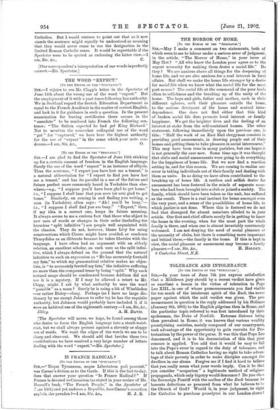[To THE EDITOR OP THE "SPECTATOR:1 SIR,—I am glad to
find the Spectator of June 14th sticking up for a certain amount of freedom in the English language. Surely the use of the word "expect" is an instance of ellipsis. Thus the sentence, "I expect you have lost me a tenant," is a natural abbreviation for "I expect to find you have lost me a tenant," and has its parallel in a use of the future and future perfect more commonly heard in Yorkshire than else- where,—e.g., "I suppose you'll have been glad to get home," e., "I suppose I shall hear that you were (or are) glad to get home." Similarly, on coming in and finding you writing, a man (in Yorkshire) often says : " Ah ! you'll be busy,"- i.e., "I suppose I shall find you are busy." "Expect," then, if my idea is a correct one, keeps its future meaning. It always seems to me a curious fact that those who object to new uses of words or changes in their order (including the harmless "split infinitive ") are people well acquainted with the classics. They do not, however, blame Livy for using constructions which Cicero might have avoided, or condemn Thneydides as an illiterate because he takes liberties with the language. I have often had an argument with an elderly relation, an excellent scholar, on such uses as the split infini- tive, which I always defend on the ground that the natural infinitive to such an expression as "He has accurately foretold my fate," to which my grammatical relative makes no objec- tion, is "to accurately foretell my fate," the infinitive suffering no more than the compound tense by being "split." Why such natural usage should be condemned because Addison did not use it is a mystery. If I may be allowed a retort to Mr. Clapp, might I ask by what authority he uses the word "possible" as a noun ? Surely be is using a bit of Wimbledon —or rather Bisley—slang. Perhaps (as I have no large dic- tionary by me except Johnson to refer to) be has the requisite authority, but Johnson would probably have included it if it were an habitual use of the eighteenth century.—I am, Sir, &c., [The Spectator will never, we hope, be found among those who desire to force the English language into a strait-waist- coat, but we shall always protest against a slovenly or sloppy use of words. We want the edges of the words we use to be sharp and clear-cut. We should add that besides these two contributions we have received a very large number of letters dealing with the word "expect."—En. Spectator.]






































 Previous page
Previous page